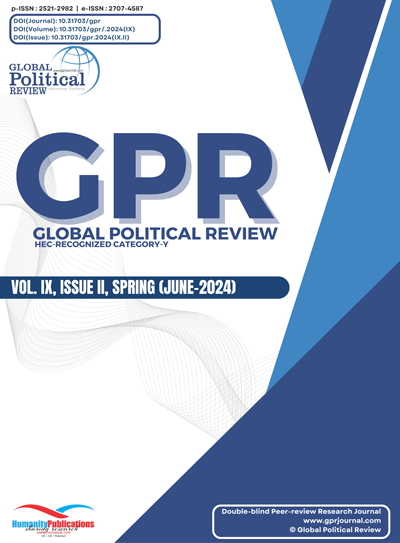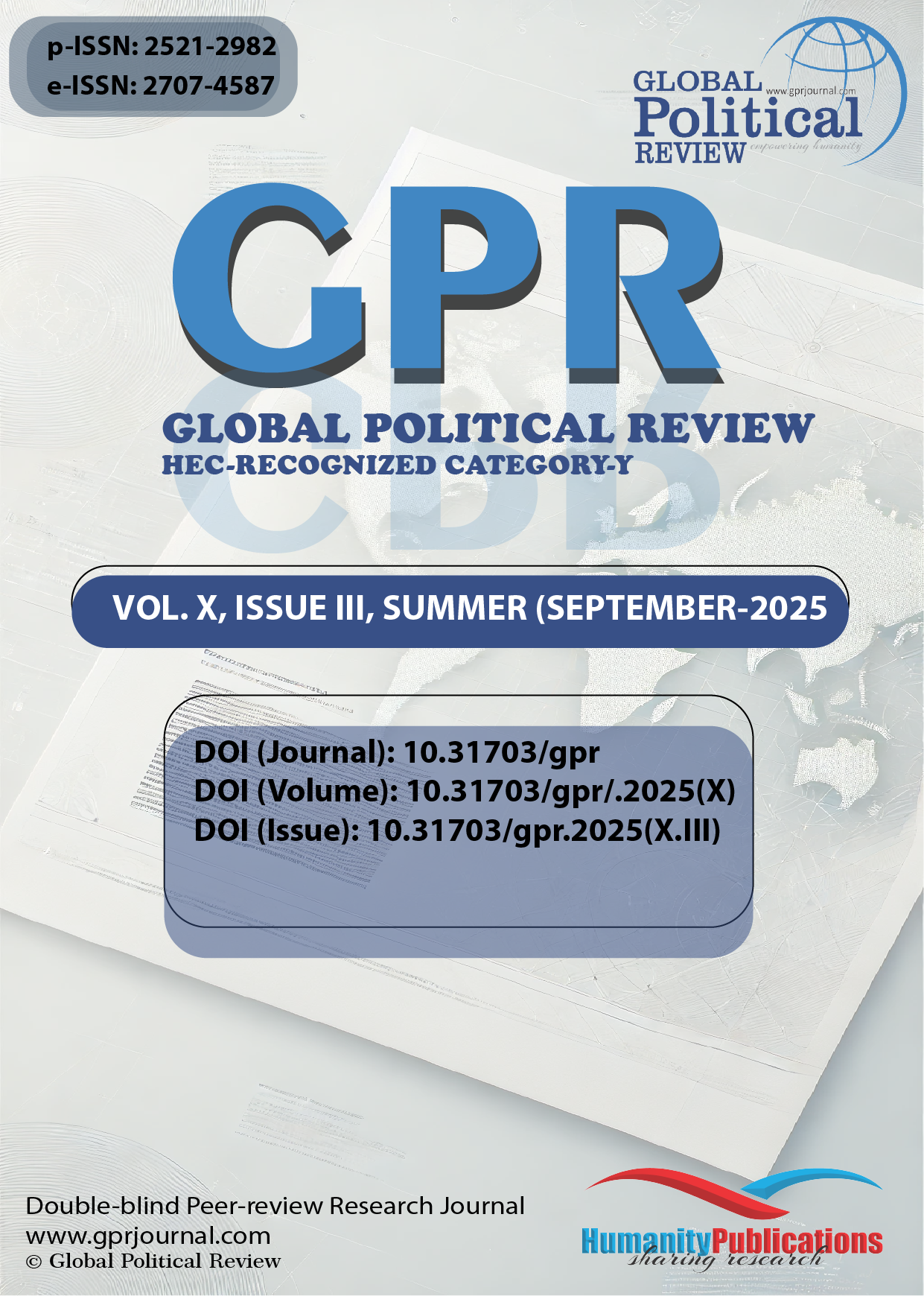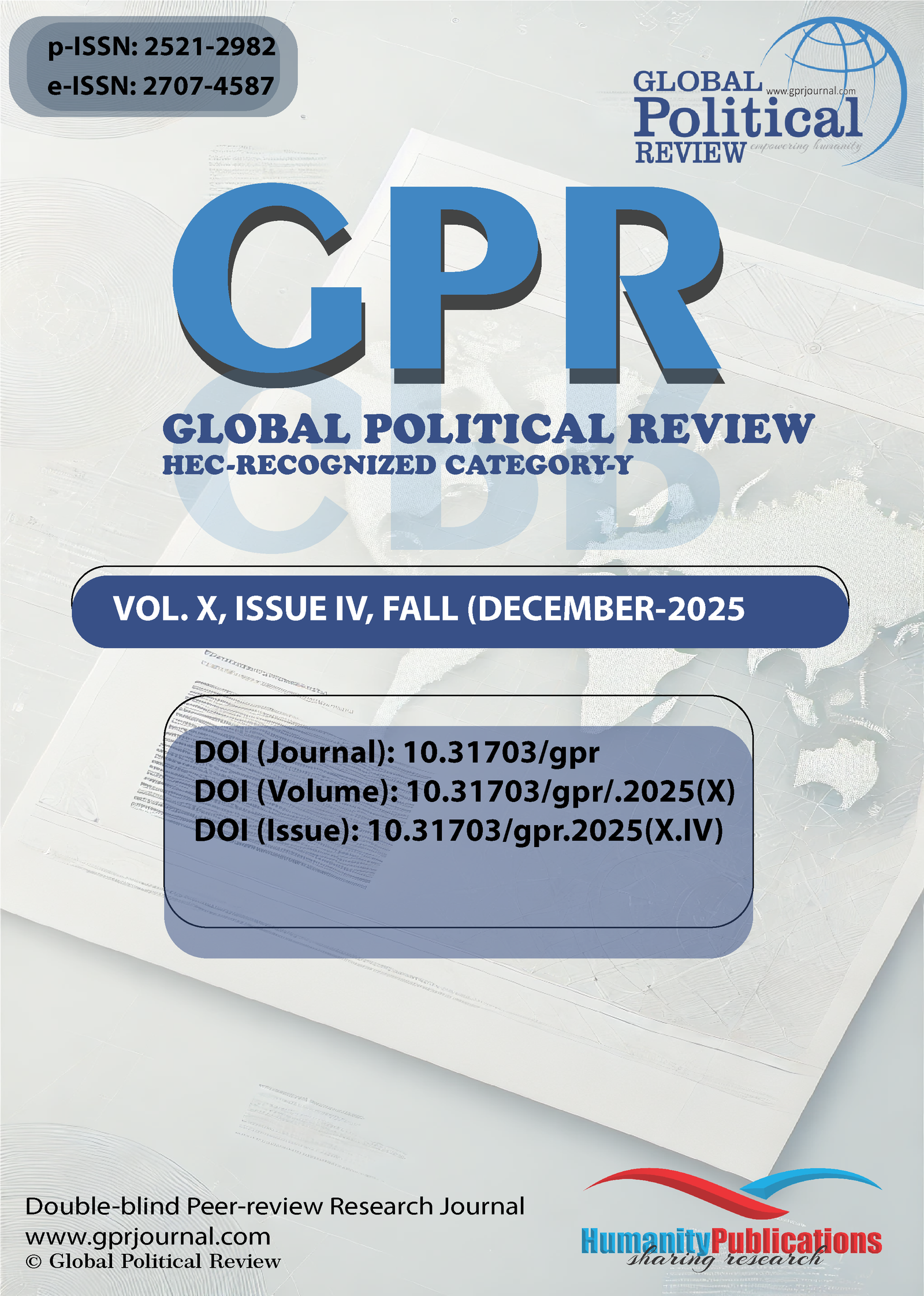
Global Political Review
-
Address
Office #1,2, First Floor, Fazal Arcade,
F-11 Markaz, Islamabad, Pakistan. -
Email address
managingeditor@gprjournal.com
Monday to Friday 9am - 7pm -
Contact information
info@gprjournal.com, +92 332 9147618
Monday to Sunday 24 Hours
- Publishing research Since2016
- Publication FrequencyQuarterly
- Access TypeOpen Access
Global Political Review (GPR) is published by Humanity Publications, a leading publishing house in Pakistan in research and analytics, that assists researchers in advancing research outcomes for societal benefit. To wipe out societal ills and to add the humanity by boosting up measures among the individuals of the global society. GPR intends to promote qualitative and quantitative researches and findings with the help of newly emerging tools and patterns utilized in experiments, observations, interviews, analysis and surveys by encircling all major segments of Political Sciences and Inter-disciplinary academic and research disciplines. GPR is a inter-disciplinary, double-blind peer-reviewed research journal which encompasses major disciplines of Political Sciences in general with specific interest in the sub-disciplines detailed at www.gprjournal.com
GPR Journal aims at human development through informed application of insight gained from the political processes. GPR Journal offers an opportunity for the researchers who share this mission and vision to publish their quality work and share it with the humanity. GPR Journal, therefore, spearheads the field of political science in solving the political problems confronted by humanity.
GPR Journal supports:
- Quality research in all areas of political science
- Excellent contents that utilizes the best research tools A platform for political scientists, academicians, researchers and professionals in allied fields to collaborate in conduct of quality research projects in political science
- Healthy dialogues, variety and respect for difference of viewpoints for uncovering the valid and reliable facts.
This paper will look at the dynamics of the foreign policy of Pakistan and its modern relationship with its neighbors including India, Afghanistan, China and Iran. The foreign policy of Pakistan is characterized by the sophisticated relations between securities, diplomatic, and economic, in which the control of conflicts, overcoming cross-border security issues, mai... read more
PDF Full TextIn the Asian federal states parliamentary democracy presents an exclusive interaction of governance framework, constitutional structure and cultural diversity. The aim of this study is to observe innovations and challenges that characterize the working of parliamentary system in the Asian federal framework. Main issues include addressing the intergovernmental tensio... read more
PDF Full TextThis study examines shifts in Pakistan’s foreign policy towards Saudi Arabia and Iran during the Pakistan Tehreek-e-Insaf (PTI) government (2018–2022) and the Pakistan Democratic Movement (PDM) government (2022–2023). It comparatively analyzes how each government managed relations with these two regional rivals and identifies the political, economi... read more
PDF Full TextThis study observed that terrorism has been one of the most destabilizing aspects of history in Pakistan. Although much has been studied about terrorism in the political and security aspects, relatively less has been put on the discursive construction of terrorism in the Pakistani print media. This research examines the coverage of leading English-language newspaper... read more
PDF Full TextJournal Metrics
Journal Indexing
Scope
GPR covers multi-disciplinary, inter-disciplinary, and trans-disciplinary issues and problems of Political sciences in its classical sense. Therefore, it welcomes articles from Social Sciences and Arts & Humanities covering Political sciences and its allied subjects and topics. Therefore, it encompasses most of the sub-disciplines of Political science (but not limited to) i.e. Government & Politics, Human & Society, Historical & Regional Studies, and Education & Mass Studies, etc.
Global Political Review (GPR) is an emerging elite scholarly journal that deals broadly with theoretical and practical aspects of regional and global issues. It discusses the sub-national, national, regional, and global crucial and attention-seeking topics of Political Science, International Relations, Peace and Conflict Studies, Defense and Strategic Studies, Diplomatic Studies, International Law, UNO, other Inter-governmental Organizations, Non-Governmental Organizations, and International Political Economy. The following details (having two segments; Areas and Subjects) show an overall scope (but not limited to) of the journal.
Areas:
- Political Science: Basic concepts of political science, such as government, power, and party. Sovereignty, election, etc., Muslim Political Thought, Western Political Thought, Chinese, Japanese, African, and Latin American Political Thought, Political Systems of Developed and Developing states, Voting Behavior, Electoral Process, Constitutions, Political Ideologies, Democracy, etc.
- International Relations: Basic concepts of IR such as Anarchy, International System, Power, Autonomy, etc. Theories of IR, History of IR, Concert of Europe, Regional Politics, IR Since 1945, Contemporary issues of IR in national, regional, and global importance, Foreign Policy of Pakistan, Foreign Policy of Major Powers, Pakistan's Relations with neighbors and world powers, Regional and Global Politics, etc.
- Peace and Conflict Studies : Basics of the Peace & Conflict Studies, Conflict Management, Conflict Resolution, Conflict Transformation, peace-making, peace-building and state-building theories and practices, Peace Theories.
- Defense and Strategic Studies: Basics of the Defense and Strategic Studies, Game Theory and Politics, Political Culture with national interest and goals, political nationalism and economic internationalism, the strategy of economic aid and trade, Theories of military strategy, Military in Politics, War Strategies, Peace Strategies, War Economy, Stability- instability paradox, nuclear politics, conventional and nuclear deterrence, Nuclear proliferation, agreements, and treaties, etc.
- Diplomatic Studies : Modern and Traditional Diplomacy, closed and open diplomacy, bilateral and multilateral diplomacy, the role of the third state/person/organization in diplomacy, diplomatic negotiations, Diplomatic Immunity, coercive diplomacy, war and peace diplomacy, NGOs and diplomacy, etc.
- International Law: Sources of International Law, International Adjudication, International Court of Justice, International Agreements and Treaties, International Organizations and International Law, Law of Seas, Law of War, Corporations, NGOs and International Law, Foreign Sovereign Immunity, The Act of State Doctrine, Use of Force and International Law, Human Rights in International Law, Interpol and International Law, UN and International Law, Peace Keeping Forces, Operations and Humanitarian Intervention in International Law...
- UNO and other Inter-governmental Organizations : UNO, structure, functions, achievements, and failures of UNO, Shanghai Cooperation Organization, Arab League, European Union, Organization of Islamic Cooperation, NATO, Warsaw Pact, ANZUS, Economic Cooperation Organization, SAARC, ASEAN, African Union, NAFTA, Gulf Cooperation Council, etc.
- Non-Governmental Organizations (NGOs) : The very idea of NGOs, the History of NGOs, NGOs and multinational corporations, NGOs and International Organizations, NGOs and World Economy, State-owned NGOs, NGOs and War/Peace relationships, etc.
- International Political Economy : IMF, World Bank, Breton Woods System, War Economy, World Trade Organization, Planned Economy, Autarky, Free Trade, Financial Globalization, Economic Development and Under-development, Climate Change and IPE, Multinational Corporations, etc.
- International Politics: Fundamentals of International conflicts and controversies between or among the states and their resolutions, sovereignty of the states, protection of national interest, foreign policy, national power, geopolitics, conflict management, war and peace, national characters, disarmaments, environmental protection, human rights, economic factors, demographic factor, problem of terrorism, etc.
- Public Policy: When the administrative executive branches of a state take some actions to address the issues faced by their inhabitant regarding every aspect of life to standardize their lives. Basics of public decision, political ideologies, action, and feedback mechanism, managing the Nation's Economy, Environmental Protection, increasing of GDP and GNP, policy analysis, social entrepreneurs, etc.
- Comparative Politics: Detailed comparison of political systems between or among the states, political institutions, conflicts of countries, functional studies, political behaviors, similarities and differences of political systems, the infrastructure of politics, political culture, political socialism, political participation, interest groups, authority and legitimacy, political processes, etc.
- Constitutional Development: The study of constitutionalism, development, and political actors of society - legislatures, executive officers, political partisans, and even the people – continually engage in the informal creation, maintenance, and transformation of constitutional meaning.
- Political Communication: Political communication refers to the making and exchange of ideas and opinions between citizens, political institutions, government officials, and associated bodies such as the media. This includes discourses on the political process in local, state, national, and international political systems as well as ways to use political information for political purposes or to achieve political aims.
- Geo Politics: The effects of geography on politics and international relations. Furthermore, it includes the study of climate, area studies, demography, topography, and natural resources. Fundamentals of boundary dispute, rival claims to a resource, or fear of a powerful neighbor—some kind of intergovernmental relations have sought means to forge solutions for mutual benefits, exchanging diplomats, signing treaties, voicing accusations and threats, making alliances, etc.
- Political Discourse: Linguistics & Literature discourses with political/critical approach, Fiction, and Novels on a political dimension, Print and Electronic media on politics, etc
Subjects:
While aiming to be inclusive for all fields (existing and emerging) of Social Sciences and Arts & Humanities with the perspectives of Political Studies, GPR hopes to receive submissions for publication in the following subjects. The listed subjects highlight the diversity of matters encompassed by GPR.
1. Human and Society
- Social Work
- Sociology
- Psychology
- Gender Studies
- Urban Studies
- Tourism & Hospitality
- Anthropology
- Business and Economics
- Criminology & Penology
- Human Rights
- Law
2. Education and Mass Studies
- Mass Communication
- Elementary, Secondary & Higher Education
- Curriculum
- TESOL
- Transformative Education
- Adult Education
- Health & Physical Education
3. Historical and Regional Studies
- History
- Heritage & Architecture
- Geography
- Pakistan Studies
- Area Studies
- Asian & African Studies
- American & European Studies
4. Government and Politics
- Political Science
- International Relations
- Defense & Strategic Studies
- Peace & Conflict Studies
- Public Policy
- Management & Public Administration
- HR & Leadership
- Developmental Studies
5. Human Society & Sciences
- Public Health
- Psychiatry
- Cyber & Artificial Intelligence
- Computational Social Sciences
- Statistical Knowledge
- Industrial Relations
- Information Sciences & Library Sciences
- Media Sciences
- Maritime Studies
- Bio-Societies &. Bioethics
- Technology & Development Studies
- Sports Sciences & Leisure Studies
- Mathematical Methods in Social Sciences
- Environmental & Climate Studies
6. Human & Arts
- Language & Linguistics
- Literature & Culture
- Fashion & Designing
- Archeology
- Philosophy
- Religion
- Radio, Television & Film
Note: This List is not comprehensive, authors are encouraged to send articles pertaining to inter-disciplinary, trans-disciplinary, and multi-disciplinary perspectives (all related topics and subjects) of Social Sciences encircling all aspects of Political Studies. We valued the newly emerging aspects of Political Studies.
Editorial Board

Dr. Rehana Saeed Hashmi, Professor, Department of Political Science, Punjab University, Lahore, Punjab, Pakistan.
rehana.polsc@pu.edu.pk

Dr. Manzoor Khan Afridi, Associate Professor of International Relations, Department of Politics & International Relations, International Islamic University, Islamabad, Pakistan.
manzoor.afridi@iiu.edu.pk

Dr. Fozia Naseem, Assistant Professor, College of Law, GC University Faisalabad., Punjab, Pakistan.
fiza.adv@gmail.com

Muhammad Usman Ullah, Senior Research Fellow, Humanity Publications ,Islamabad, Pakistan.
Usmanktk013@gmail.com
Advisory Board

Dr Muhammad Khan, Professor, International Relations-International Islamic University, Islamabad, Pakistan.
muhammad.khan@iiu.edu.pk

Dr. Muhammad Nawaz Bhatti, Associate Professor, Department of Politics & Interational Relations University of Sargodha, Punjab, Pakistan.
Muhammad.nawaz@uos.edu.pk

Dr. Umbreen Javaid, Professor, Department of Political Science, University of the Punjab, Lahore, Punjab, Paistan.
umbreen.polsc@pu.edu.pk

Dr. Ghulam Mustafa, Associate Professor, Department of International Relations, GC University Faisalabad, Punjab, Pakistan..
ghulammustafa@gcuf.edu.pk

Dr. Maurizio Scaini, Associate Professor, Faculty of Political Sciences, International Relations and Diplomacy, Gorizia Campus, University of Trieste, Gorizia.
maurizio.scaini@dispes.units.it
Archives
This article aims to explore what democracy is and what are the key tools for the success of democracy. Democracy is a famous form of government in contemporary world politics. There are few key characteristics of true democracy, for instance; free and fair elections, the role of media, education, judiciary, political parties, and religious tolerance, etc. Pakistan has experienced authoritative... read more
PDF Full Text Views (18944)The constitution of Pakistan defines our country as an "Islamic State". Pakistan is predominantly a State established for Muslims but many non-Muslims have been living here since its establishment. The constitution of Pakistan stands for equality and justice for all people regardless of caste, gender, religion, region and language. Qualitative methodology has been used. The available data will ... read more
PDF Full Text Views (9183)Child labor is the growing curse in the world particularly in the developing countries and Pakistan is also the victim of this growing global phenomenon because of multiple reasons behind which encourage intentionally or unintentionally the dilemma of child labor. Child labor had multiple side effects that disturb the social fabric of the society and its growing statistics alarms the government... read more
PDF Full Text Views (6037)Federalism provides opportunity to the diverse societies with the distinct cultural and geographical heritage of such constitutional arrangements that they can strengthen their bond with the rest of the areas of a state. Federalism in Pakistan started in a unique way where its two main regions had no geographical adhesion. The west wing of Pakistan is culturally diverse. People of FATA lived th... read more
PDF Full Text Views (5330)China-Pakistan Economic Corridor (CPEC), a cluster of infrastructure-build-up projects for Pakistan with Chinese assistance was signed in 2013. The Rise of China had kept the U.S. perturbed for the last two decades, however its Belt and Road Initiative (BRI) added salt to injury. The U.S. expressed its displeasure over CPEC, its policy makers gradually started bracketing Pakistan with China. At... read more
PDF Full Text Views (5066)Cybercrime or electronic crime is a very diverse and expanding phenomenon. It has no boundaries. For people from different walks of life, its really hard to understand it. No exact definition of cybercrime can be given. Cybercrime in Pakistan has immensely increased in the past two decades. We had no digital forensic and information data experts. No latest system was available. Previously we ha... read more
PDF Full Text Views (4868)A key feature of contemporary international politics is the changing nature of American presence on the world stage. Before the COVID-19 pandemic emerged, power of the United States (U.S.) as a unipolar superpower was experiencing change, giving way to multipolarity. For the past three decades, America was the predominant global power, leading the international response to every man-made or nat... read more
PDF Full Text Views (4725)Every year, the United Nations General Assembly holds a meeting of leaders from different countries. Imran Khan, prime minister of Pakistan, made speeches in the General Assembly of the United Nations twice. The first emphatic address he made at the United Nations General Assembly was on 27 September 2019, and the second was on 25 September 2020. This study aims to find out the major themes in ... read more
PDF Full Text Views (4684)China Pakistan Economic Corridor (CPEC) has been identified as a "game-changer" for Pakistan. Pakistan is facing two vital issues in recent times; one, the energy crisis and second, the lack of industrial capabilities. This paper explores that how CPEC is helpful in resolving the issue of the energy crisis in Pakistan. The industrial development in Pakistan through the CPEC project is also disc... read more
PDF Full Text Views (4602)This paper aims to highlight the speech acts which have been working behind the first speech that has delivered by Imran Khan as Prime Minister of Pakistan at 26, July 2018. It is a political discourse that attracts the researcher's interest. The objective of this paper is to answer what type of speech acts have been used by Imran Khan, the overlapping of what speech acts occur in Imran Khan's ... read more
PDF Full Text Views (4531)This article aims to explore what democracy is and what are the key tools for the success of democracy. Democracy is a famous form of government in contemporary world politics. There are few key characteristics of true democracy, for instance; free and fair elections, the role of media, education, judiciary, political parties, and religious tolerance, etc. Pakistan has experienced authoritative... read more
PDF Full Text Downloads (337)Federalism provides opportunity to the diverse societies with the distinct cultural and geographical heritage of such constitutional arrangements that they can strengthen their bond with the rest of the areas of a state. Federalism in Pakistan started in a unique way where its two main regions had no geographical adhesion. The west wing of Pakistan is culturally diverse. People of FATA lived th... read more
PDF Full Text Downloads (255)Muhammad Ali Jinnah called for the division of India on 22ndMarch 1940 in his presidential address to the annual session of the All-India Muslim League held at Lahore. Immediately, the League were beset with not only opposition from all flanks but also the allegation that Jinnah's idea of Pakistan was ill-defined and merely a counter for bargaining. Even after Pakistan's independence in 1947, t... read more
PDF Full Text Downloads (203)This paper aims to highlight the speech acts which have been working behind the first speech that has delivered by Imran Khan as Prime Minister of Pakistan at 26, July 2018. It is a political discourse that attracts the researcher's interest. The objective of this paper is to answer what type of speech acts have been used by Imran Khan, the overlapping of what speech acts occur in Imran Khan's ... read more
PDF Full Text Downloads (134)Modern-day democracies are constructed on the constitutional mechanism of separation of powers introduced in the U.S. Constitution where Pakistan stands with no exception. With qualitative research methodology, this paper aims to investigate the following issues: origin and evolution of the concept of separation of powers with reference to formalist and functionalist theories, application of tr... read more
PDF Full Text Downloads (84)Every year, the United Nations General Assembly holds a meeting of leaders from different countries. Imran Khan, prime minister of Pakistan, made speeches in the General Assembly of the United Nations twice. The first emphatic address he made at the United Nations General Assembly was on 27 September 2019, and the second was on 25 September 2020. This study aims to find out the major themes in ... read more
PDF Full Text Downloads (76)Pakistan is a religious and Islamic state. The religion followed in Pakistan is Islam with a proportion of 98% being a peaceful religion; it protects the rights of every individual without discrimination of any religion. The constitution of Pakistan also protects the rights of every citizen. In this paper, the researchers have tried to figure out the meaning of interfaith harmony and how state ... read more
PDF Full Text Downloads (67)Social Networking sites are highly used for political proposes. In this study, the research tried to search the usage of social media by political parties during elections campaigns 2018 in Pakistan. The researcher applied the agenda-setting theory to link the social media posts of these political parties' pages and content analysis research technique for analyzing the variables. It was conclud... read more
PDF Full Text Downloads (67)The current research provides an analytical study on the domestic and international arbitration and the application of foreign arbitral awards in Pakistan. The research explains the international arbitration, how it operates, its processes, rulings, and execution as per the domestic arbitration mechanism existing in Pakistan. The study further identifies the flaws that render it impossible to c... read more
PDF Full Text Downloads (63)In this research article I comprehend that how women in Pashtun society, even with limited entree to civic places, manage to join and contribute in numerous political undertakings, and how their role adds to growing communal and political spaces for women. For my research work I interviewed politically active women of Swabi from lower and middle class. I used the method of convenience sampling.... read more
PDF Full Text Downloads (51)






























